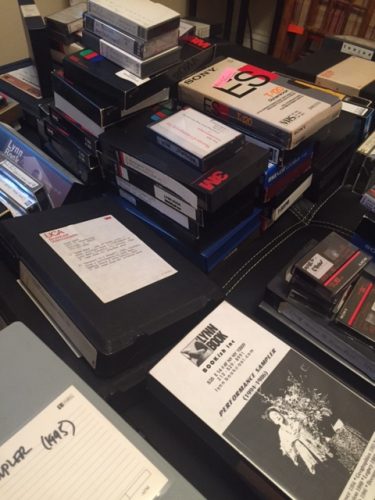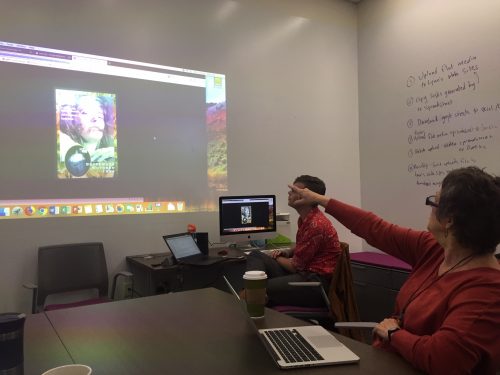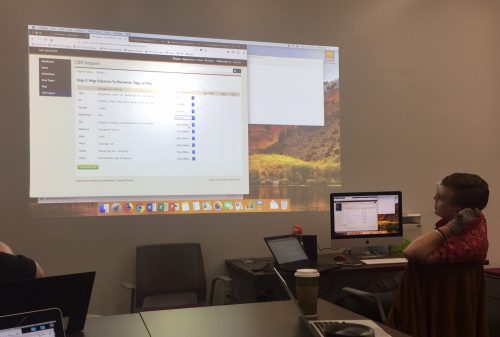This article is more than 5 years old.
Since 2017, members of ZSR’s Digital Initiatives and Scholarly Communications (DISC) and Technical Services teams have been collaborating with Lynn Book (Department of Theatre and Dance) to build a digital showcase of Book’s past performances. We are excited to announce the launch of the project’s first phase, Gorgeous Fever, a piece originally performed throughout the 1990s in cities around the US, now reanimated on the web platform Omeka as an interactive digital exhibit.
Lynn Book has been creating interdisciplinary, transmedia art pieces and performing them in international venues for four decades, so it’s not surprising that she has amassed quite a collection of video footage, photographs, slides, programs, notecards, stage props, and storyboards documenting these performances over the years.
When Book first approached ZSR’s Digital Initiatives team about digitizing her collection–which included video stored on VHS, 8mm/Hi8, and MiniDV cassettes–our first step was to take inventory of the entire collection and document the various file formats. Lynn partnered with Wake Forest alumnus and START Gallery manager Jay Buchanan (‘13), who took the lead in creating the “Lynnventory,” which became to the foundational document of the project team’s work.

The next step in the project was to determine what media could be digitized in-house, and what items would need to be sent elsewhere to be digitized. Luckily, Barry Davis was able to convert VHS and audio files to digital formats, and Melde Rutledge digitized all flat media. Other media were sent to Epic Media, a local Winston-Salem business.
Once the Gorgeous Fever collection was digitized, Buchanan began the process of creating robust metadata for each item in the Gorgeous Fever collection. The metadata was then mapped onto Dublin Core metadata elements when imported into Omeka, resulting in a rich collection of digital artifacts from the Gorgeous Fever performance. As the project grows, both the project team and visitors to the digital exhibit will use the metadata to navigate, sort, and interact with the site’s content.
The project team secured a Digital Innovations grant from the Humanities Institute to cover digitization fees; provide stipends for research assistants; and fund site visits to the New York Public Library for the Performing Arts, New York University’s Hemispheric Institute of Performance and Politics, and the Electronic Arts Intermix. And since the project team and the DISC team were all learning-while-doing, the team created a Data Management Plan to document all of our steps: from data storage and backup to file naming conventions to metadata creation. This plan will be used for future phases of project development, and will be especially helpful as project team members come and go.
Many aspects of the Lynn Book Project have served as valuable pilot projects for the DISC team, as this is the first self-hosted Omeka site that we have supported, and the first mass-digitization project that we have orchestrated. The collaborative spirit of everyone involved has been crucial to the success of the Gorgeous Fever digital exhibit. We have all learned (many times over!) that there is no magic wand or single out-of-the-box solution for such a large project. It’s been fun making decisions together, documenting those decisions, and also changing our mind a few times!


To celebrate the new digital life of this Gorgeous Fever, Book is hosting Performing the Archive, a salon screening and roundtable conversation, on April 2 at 5:00 in the ZSR Auditorium. Please join us to see archival footage of Gorgeous Fever and to discuss the development of a creative research digital exhibit.
Stay tuned for more blog posts from the DISC team about their roles in building the digital exhibit!

6 Comments on ‘Archiving Performance and Performing the Archive’
Carrie, this is awesome and exciting! I can’t wait to learn more about this important project! I’m marking my calendar! Thanks for posting!
Great post on how this project came to fruition. Thanks Carrie!
I am proud of all the work DISC team members have invested in the Gorgeous Fever project. Can’t wait to see how Lynn presents it at her Performing the Archive event next month!
I can’t wait to see this, I know everyone involved has put in an enormous amount of thought and work to making it happen!
What an amazing job you all have done!! So looking forward to seeing this presentation!
Thanks for sharing a bit “under the hood” about what goes into projects like these – lots of different kinds of skills and resources at work!